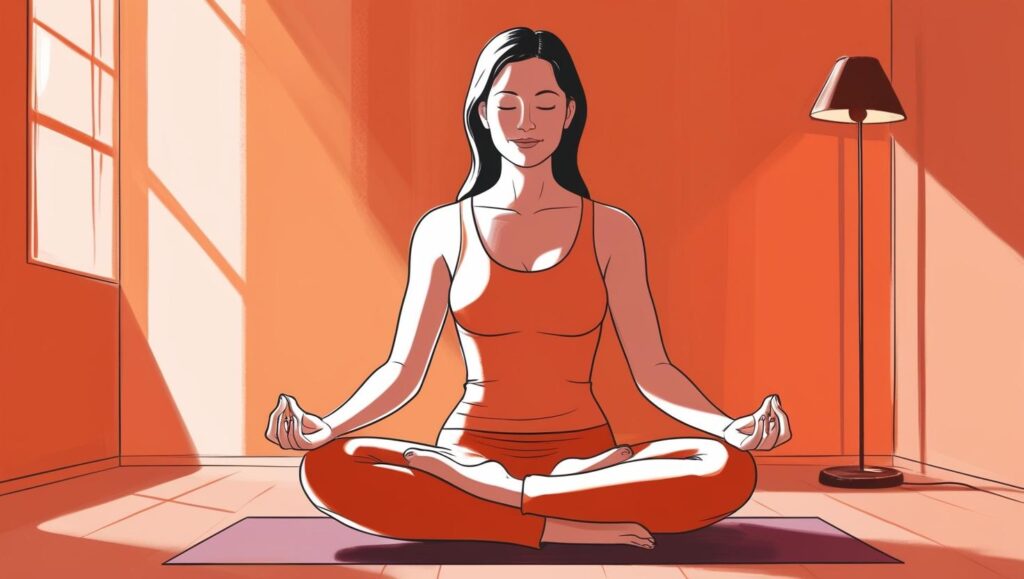In our fast-paced digital world, constant notifications and endless information can leave you feeling overwhelmed and mentally drained. Have you ever wondered why it’s so hard to focus or why you feel burned out? Reducing brain overstimulation isn’t just about taking a break—it’s a scientifically backed way to reclaim your calm, boost your mental clarity, and improve overall well-being. In this guide, you’ll find practical techniques that you can implement right away.
What Is Brain Stimulation and Overstimulation?
Stimulation is any action that increases brain activity or excitement, while a stimulus is the factor that triggers this activity.
Brain stimulation encompasses all activities that activate or enhance brain function, from reading a book to taking a walk.
Overstimulation happens when your brain is bombarded with too many stimuli at once, making it difficult to process information effectively. This overload can lead to feelings of burnout, stress, and fatigue.
Key Causes Include:
- Too Much Screen Time: Excessive social media, gaming, or binge-watching.
- Constant Notifications & Multitasking: Frequent messages and task-switching.
- High-Stress Levels: Work overload, exams, or personal issues.
- Too Much Noise & Sensory Input: Crowded places, loud music, or bright lights.
- Excessive Caffeine or Stimulants: Overindulging in coffee or energy drinks.
- Lack of Sleep: Insufficient rest that leaves your brain overwhelmed.
Signs You’re Overstimulated:
- Racing Thoughts: Difficulty slowing down your thinking.
- Restlessness & Anxiety: Feeling constantly on edge.
- Difficulty Focusing: Trouble concentrating on tasks.
- Mental Exhaustion: Feeling drained after minimal activities.
- Irritability & Mood Swings: Overreacting to minor issues.
Understanding both the causes and the signs of overstimulation is essential—it allows you to pinpoint which aspects of your daily routine might be overwhelming your brain and where you can start making positive changes.
Techniques to Reduce Brain Overstimulation
Each of the following strategies is supported by scientific research and practical experience. Integrate these techniques into your daily routine to help reclaim mental clarity and calm.
1. Meditation

Why It Works:
Meditation has been shown to reduce activity in the brain areas associated with stress. For instance, MRI studies reveal that after eight weeks of regular practice, the amygdala—the brain’s “fight or flight” center—can shrink, leading to reduced emotional reactivity and better stress management.
How to Get Started:
- Position: Sit or lie on a firm surface for better posture and focus.
- Hand Placement: Place one hand on your stomach and the other on your chest.
- Breathing: Inhale slowly, feeling your stomach rise while keeping your chest steady.
- Environment: A dimly lit room can help create a calming atmosphere
Meditation is not about forcing your mind to be silent; it’s about gently guiding your focus. Over time, even short, consistent sessions can lead to profound improvements in emotional regulation and stress resilience.
Tip: Start with just 5 minutes daily and gradually increase your practice.
2. Mindfulness
Why It Works:
Mindfulness interrupts the autopilot mode that often leads to mental fatigue. By training yourself to stay present, you prevent your thoughts from spiraling and reduce overall stress.
Effective Mindfulness Techniques:
- Focused Attention: Concentrate on your breath, a mantra, or a specific object.
- Open Monitoring: Observe your thoughts and feelings without judgment.
- Body Scan: Gradually bring awareness to each part of your body from toes to head.
- Walking Meditation: Notice the sensations and rhythm of your movement as you walk.
- Mindful Breathing: Pay close attention to the flow of air as you inhale and exhale.
Regular mindfulness practice can improve concentration and create a buffer against the constant demands of modern life. Even brief moments of mindful awareness can help break the cycle of stress and overstimulation.
3. Sleep and Rest

Why It Works:
Quality sleep is critical for brain recovery. During sleep, the brain detoxifies and clears out neurotransmitters like dopamine and serotonin that accumulate during the day, helping to reset your mental state.
How to Improve Sleep:
- Aim for 7-8 hours of quality sleep per night.
- Maintain a consistent sleep schedule—even on weekends.
- Develop a calming bedtime routine, such as dimming the lights and turning off screens 30 minutes before bed.
Consistent, restorative sleep not only improves mood and cognitive function but also enhances your ability to manage daily stress. Prioritizing rest can be a game-changer in reducing overstimulation.
If you are looking to make a nighttime self-care routine, I have made a guide that can help you with that
4. Physical Activity

Why It Works:
Regular exercise boosts the production of brain-derived neurotrophic factor (BDNF), which supports neuron growth and enhances cognitive function. It also helps reduce inflammation and improve sleep quality.
Benefits of Exercise:
- Improves attention, memory, and problem-solving skills.
- Reduces symptoms of anxiety and depression.
- Promotes overall brain health by keeping neural pathways active.
Even moderate exercise, such as a 20-minute walk, can significantly clear your mind and improve focus. Physical activity not only benefits the body but also acts as a natural antidote to mental fatigue.
5. Diet and Nutrition

Why It Works:
Your brain requires a balanced diet rich in essential nutrients to function optimally. A well-balanced diet helps regulate blood sugar levels, boosts neuroplasticity, and prevents the crash that can lead to overstimulation.
Key Nutrients for Brain Health:
- Omega-3 Fatty Acids: Support cognitive function and reduce mental fatigue.
- Antioxidants: Combat oxidative stress and improve mental clarity.
- Vitamins & Minerals: Aid in neurotransmitter production and overall brain regulation.
Incorporating nutrient-rich foods into your daily meals can have a profound impact on your mental performance. A steady supply of the right nutrients helps sustain your energy levels and maintains a balanced mood throughout the day.
6. Cooling Down
Why It Works:
Taking deliberate breaks signals to your brain that it’s time to slow down. This helps lower cortisol levels and eases your mental state, transitioning you from high alert to relaxation.
How to Cool Down:
- Do a low-stimulation hobby: Painting, knitting, puzzles, or playing a musical instrument.
- Read a book: Fiction, poetry, or calming non-fiction can help shift your focus.
- Sip on a warm, caffeine-free drink: Herbal tea or warm milk can promote relaxation.
- Take a warm bath or shower: it helps in relax muscles and signals your body to wind down.
Integrating these cooling-down periods into your day helps create a natural rhythm, reducing the risk of burnout and making your schedule feel more balanced.
7. Grounding Techniques
Why It Works:
Grounding techniques help redirect your focus to the present moment, preventing spiraling negative thoughts and reducing anxiety.
Effective Methods:
- Deep Breathing: Inhale slowly, hold, and exhale fully.
- 5-4-3-2-1 Method: Identify sensory details around you—five things you see, four you feel, three you hear, two you smell, and one you taste.
- Physical Grounding: Use a cold object or splash water on your face.
Regular grounding not only stabilizes your mood but also builds resilience against unexpected stressors. This simple practice can be especially beneficial during moments of acute anxiety.
8. Progressive Muscle Relaxation (PMR)
Why It Works:
PMR reduces muscle tension throughout the body, thereby alleviating physical stress and promoting deep relaxation.
Steps for PMR:
- Start at your toes and tense the muscles for a few seconds.
- Gradually release the tension.
- Progress through each muscle group, moving upward to your head.
PMR increases your awareness of where you hold tension, allowing you to address stress before it accumulates. This technique not only improves sleep quality but also enhances overall well-being by fostering a deeper connection between body and mind.
9. Self-Care

Why It Works:
A dedicated self-care routine is essential for nurturing both mental and physical well-being. It builds resilience against everyday stress and fosters a balanced lifestyle.
Self-Care Strategies:
- Engage in hobbies that bring you joy.
- Spend quality time with loved ones.
- Keep a gratitude journal to focus on positive experiences.
- Set healthy boundaries to protect your energy.
Self-care isn’t an indulgence—it’s a necessity. By regularly dedicating time to activities that rejuvenate you, you can improve productivity, strengthen relationships, and achieve a deeper sense of fulfillment.
10. Seek Professional Help
Why It Works:
Sometimes, self-help techniques might not be enough. Professional guidance can offer personalized strategies to manage stress and improve mental health effectively.
When to Consider Professional Help:
- If you’re struggling to manage stress on your own.
- If persistent anxiety or burnout is affecting your daily life.
- When you feel that your emotional well-being requires a tailored approach.
Consulting a mental health professional can provide you with customized therapies or medications if needed. Remember, seeking help is a proactive and courageous step toward achieving a healthier, more balanced life.
Conclusion
In a world brimming with constant stimuli, learning to manage brain overstimulation is vital for maintaining your mental and physical health. By integrating these scientifically supported techniques—meditation, mindfulness, quality sleep, physical activity, balanced nutrition, cooling down, grounding, PMR, self-care, and seeking professional help—you can reclaim your mental clarity and overall well-being.
Next Steps:
Experiment with one or two of these strategies this week, and observe how they improve your mood and focus. Share your experiences in the comments or reach out with any questions. Your journey to a calmer, more focused mind starts now!

I saw a lot of website but I believe this one contains something special in it in it
Thank you so much for that,
Would love too see you here again!
very interesting topic, great post.
Thank you!
An interesting discussion is price comment. I feel that you must write extra on this topic, it might not be a taboo topic however generally people are not sufficient to speak on such topics. To the next. Cheers
That’s a nice observation, I would edit when I get a bit more time and include those details!
Thanks for the feedback , really appreciat it!
Comeback soon!
I absolutely love your website.. Pleasant colors & theme.
Did you create this site yourself? Please reply back as I’m wanting to create my own personal blog and would
love to know where you got this from or what the theme is called.
Many thanks!
Thanks man so much for the kind words!
And yes , I did make this on my own using the wordpress website , I bought a year plan for this, and this theme is called kadence!
And if you wanna know anything else, you can contact me on the instagram handle , @1cozycareclub
Would love to see you again, as I improve the colours and make this website more organised!
Hi, I read your blog on a regular basis. Your story-telling style is awesome, keep doing what you’re
doing!
I do accept as true with all of the ideas you have
offered on your post. They are very convincing and can definitely work.
Still, the posts are too short for beginners.
Could you please lengthen them a little from subsequent time?
Thanks for the post.
What’s up every one, here every one is sharing these kinds of familiarity, thus it’s pleasant to read this
website, and I used to visit this web site daily.
My family members all the time say that I am wasting my
time here at net, except I know I am getting
knowledge every day by reading such good articles
or reviews.
I enjoy what you guys are usually up too. This
kind of clever work and exposure! Keep up the
great works guys I’ve incorporated you guys to our blogroll.
Pretty nice post. I just stumbled upon your weblog and
wanted to say that I have really enjoyed surfing around your blog posts.
In any case I will be subscribing to your feed and I hope you write
again soon!